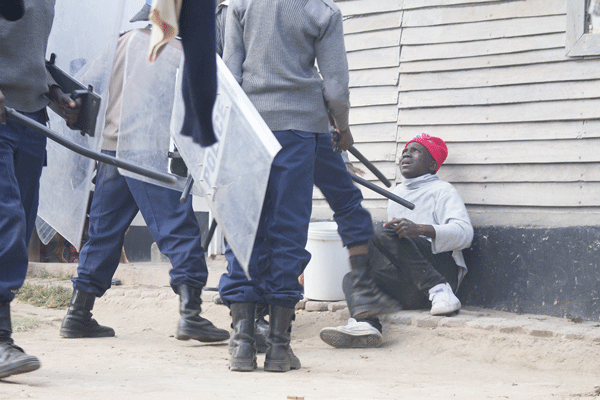
Since independence it has been a taboo to compare Zimbabwe with Rhodesia. Understandably, the two are not comparable as variables differ, but a dissenting heart yearns. Attempts to draw those parallels are now as widespread as the current wave of rancour.
Tapiwa Gomo
It is not uncommon for colleagues from other countries to ask what really went wrong in Zimbabwe. And the answer to that question is not easy, as our downfall was certainly not an event, but a very long process of deceit, treachery and chicanery, which largely stole from our humility and patience.
A few weeks ago, I had a chance to chat with my uncle, who over the years was an active member of Zanu PF. I asked him what went wrong, as he has been part of the system until the 2008 elections, when it became clear that the country was headed nowhere. People of his age like telling stories. So after a pause, he started by saying: “I will tell you a story nephew.”
“Once upon a time, a kingdom was invaded by foreigners. They took control of all resources. The kingdom was reduced to nothing, as everyone became a slave to the foreigners. Many years of trying to negotiate with the foreigners to regain control of the kingdom did not yield anything until the warriors from the land mobilised and put their lives at risk to liberate their kingdom. They put their lives at risk to reclaim their dignity.
“All parents sent their sons and daughters of teenage and above to the battlefield to fight against the foreigner, who had more sophisticated weaponry than the warriors. They were undeterred and unrelenting. The communities in the kingdom sacrificed their belongings to win back their dignity. They lost their livestock and everything they had in order to reclaim their identity. Most of the yields from farms were set aside to feed the warriors. They chose to be poor in order to be free.
“As the war intensified, the warriors got stronger, wiser and more confident. They started preaching to motivate the fast impoverishing and despairing communities about the promises of the new day — that they would regain their cattle, their lost land shall be reclaimed, they shall prosper and that the kingdom will be a land of milk and honey. At the break of dawn, the battle was finally won and the kingdom was reclaimed.
- Chamisa under fire over US$120K donation
- Mavhunga puts DeMbare into Chibuku quarterfinals
- Pension funds bet on Cabora Bassa oilfields
- Councils defy govt fire tender directive
Keep Reading
“Euphoria and jubilation engulfed the villages of the kingdom. The nation was pregnant with promises and hope. With the battle won and the land reclaimed, what was there to remain awake for? The nation called it a night, but too early. Before they went to bed, the little that remained of the livestock, crops etc. was sold to send their children to school so they could become relevant in the new nation. Once again, they chose to be poor so they could educate their children.
“Tambaoga, who had led the warriors in the last phase of battle had taken over management of the kingdom. He was so learned and intelligent and no-one doubted his ability to steer the kingdom forward, as the tired nation went to sleep.
“But the same euphoria and jubilation blurred Tambaoga’s true colours. As the nation went to sleep, Tambaoga, just a year after liberation of the kingdom deployed his internal guard to kill people from the south, whom he suspected to be disloyal to his management style.
“During the same period, he pursued a one party-kingdom, which meant no one else would challenge him and his leadership. When his one party-kingdom failed because one of his friends woke up to disrupt Tambaoga’s machinations, he was patient enough to sneak a clause on executive powers in the Constitution, which gave him absolute powers seven years after the liberation of the kingdom. And again, the nation continued sleeping.
“As Tambaoga’s power mongering was unfolding, the nation continued sleeping, enjoying the fantasies of the mirage of milk and honey in dreamland, as they imagined them from the seasons of the foreigners. By the time, they woke up, it was too late, as Tambaoga had filled the palace with his own people and fenced it with the foreigner’s equipment, amassed so much power for himself and he had literary made himself the king contrary to the causes of the liberation struggle.
“With absolute power in his hands, the economy, left by the foreigner, was mismanaged, the producers of food were chased out, food reserves were depleted, water dried out in the rivers and a cloud of political confusion engulfed the kingdom, and poverty and disease beset the sleeping nation. And every little thing that remained was for Tambaoga and his close allies. Tambaoga became untouchable. He sold life for political allegiance. He anointed, appointed and disappointed at will as the nation became poorer.
“Several efforts to get rid of Tambaoga from power were unsuccessful because when the nation slept too long, he manipulated the system to his favour and protected himself as an announced king of the kingdom. He became more powerful than the foreigner. You need stronger power to remove power, but the nation became weaker due to poverty. Even as the nation woke up, they were yet to realise that Tambaoga no longer subscribed to people-driven leadership as he had become a king.
“If the nation had not slept from the early stages of liberation, maybe Tambaoga would have been a better person or the nation would not have allowed him to amass so-much power..
Nonetheless, the nation went to sleep too early and that is how the land ended up where it is today.”
Tapiwa Gomo is a development consultant based in Pretoria, South Africa












